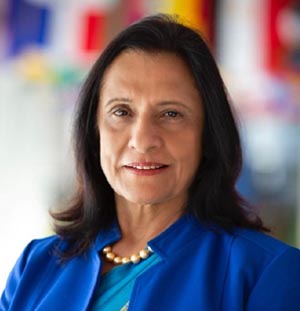 |
| Dr Poonam Khetrapal Singh |
New Delhi, June 20, 2021 (News Team): The World Health Organization today called upon countries in WHO South-East Asia Region to scale up and rigorously implement public health and social measures, along with efforts to accelerate vaccination for COVID-19, to prevent another surge, as more countries confirmed prevalence of highly transmissible variants of concerns.
“We need to continuously strengthen our efforts to test, trace and isolate. Societal interventions such as physical distancing, hand hygiene and proper wearing of masks need to be stringently implemented. These measures should be in full force and for longer periods in areas reporting more transmissible variants of concerns,” said Dr Poonam Khetrapal Singh, Regional Director, WHO South-East Asia.
The public health and social measures are a wide range of nonpharmaceutical interventions, both individual and societal, and are cost-effective measures to reduce the spread of SARS-CoV-2, and save lives.
In addition to personal protective measures, they include cleaning, disinfection, ventilation, surveillance. Contact tracing, isolation and quarantine. Physical distancing measures such as limiting the size of gatherings, maintaining distance in public or workplaces, domestic movement restrictions; and international travel-related measures.
“These measures are critical for preventing infections, reducing transmission and saving lives”, the Regional Director said.
Even as countries scale up vaccination against COVID-19, they need to implement public health and social measures in tailored and agile way, she said.
A risk-based approach is needed for public health and social measures. These measures should be implemented by the lowest administrative level and continuously adjusted to the intensity of transmission and the capacity of health systems.
The capacity of the health systems includes both clinical care for COVID-19 and non COVID-19, and public health services such as case detection, diagnostic testing, contact tracing. The risk assessment should measure both the actual ability to deliver services, and the performance of those services, Dr Khetrapal Singh said.
“Where more transmissible Variants of Concern are spreading, these measures need to be applied more stringently and for longer periods,” the Regional Director said.
Earlier this week Maldives and Myanmar confirmed transmission of Variants of Concern. Earlier, Variants of Concern have been confirmed in Bangladesh, India, Indonesia, Nepal, Sri Lanka, Thailand and Timor-Leste.
The Variants of Concern, along with opening of economies and societies, contributed to the recent surge in cases globally.
Countries across the world are currently at different phases in the evolution of the COVID-19 pandemic and face varying epidemiological situations. Though the Region is now witnessing an overall decline in cases, mainly due to decreasing cases reported in India, in some other countries the cases are still increasing.
(https://www.who.int/southeastasia/outbreaks-and-emergencies/novel-coronavirus-2019/sear-weekly-situation-reports)
“We must not forget that the pandemic is still around. We must guard against complacency, at any level. We must continue to implement combinations of public health and social measures until globally there high COVID-19 vaccine coverage among health workers, and high-risk and vulnerable groups,” the Regional Director said.
